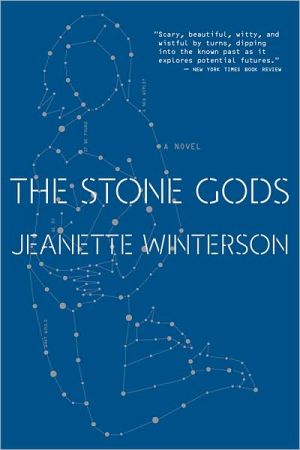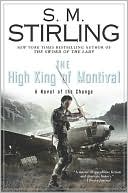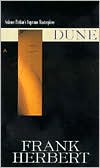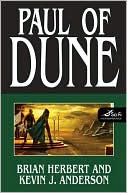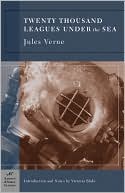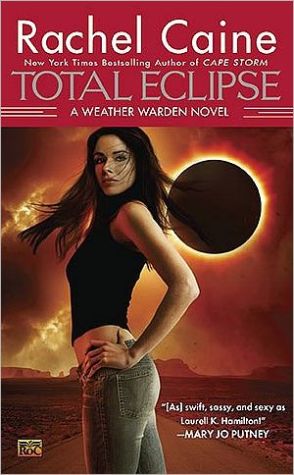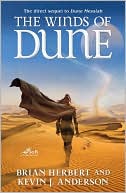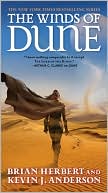The Stone Gods
Playful, passionate, provocative, and frequently very funny, Jeanette Winterson's The Stone Gods is a story about Earth, about love, and about stories themselves.\ On the airwaves, all the talk is of the new blue planet—pristine and plentiful, as our own was 65 million years ago, before we took it to the edge of destruction. Off the air, Billie Crusoe and the renegade Robo sapien Spike are falling in love. Along with Captain Handsome and Pink, they're assigned to colonize the new blue planet....
Search in google:
This new world weighs a yatto-gram. But everything is trial-size; tread-on-me-tiny or blurred-out-offocus huge. There are leaves that have grown as big as cities, and there are birds that nest in cockleshells. On the white sand there are long-toed claw prints deep as nightmares, and there are rock pools in hand-hollows finned by invisible fish . . . Mankind has rendered its planet unlivable and is beginning to colonize a new blue planet. Our heroine Billie Crusoe’s flight to the future is also a return to the distant past—“Everything is imprinted forever with what once was.” What begins as a witty, satirical futurist adventure deepens into a dazzling exploration of our relationship to environment, to power and technology, and to what defines us as humans. For over twenty years Jeanette Winterson has consistently been one of our most brilliant writers. Lyrical, visionary, by turns funny and devastating, The Stone Gods is fiction at its most provocative.The Barnes & Noble ReviewIn May 1969, science fiction titan Isaac Asimov published an essay entitled "The Power of Progression." A fervent believer in population control as a necessary first step to solving mankind's many problems, Asimov -- in what seems a moment of icy-eyed and angry despair -- decided to use his mathematical skills and prodigious imagination to highlight the dangerous arrogance of our species when it came to outstripping our environment. Assuming the historical rate of population growth and adding in the magical ability to transform all of creation into sustenance and thus exponentially replicate ourselves across the entire cosmos without hindrance, Asimov asked, "How long would it take for the entire mass of the known universe to be turned into flesh and blood?" The answer: a shockingly short 6,700 years.
\ The Stone Gods\ \ By JEANETTE WINTERSON HARCOURT, INC. \ Copyright © 2007 \ Jeanette Winterson \ All right reserved.\ \ ISBN: 978-0-15-101491-0 \ \ \ Chapter One Planet Blue \ This new world weighs a yatto-gram.\ But everything is trial-size; tread-on-me tiny or blurred-out-of-focus huge. There are leaves that have grown as big as cities, and there are birds that nest in cockleshells. On the white sand there are long-toed clawprints deep as nightmares, and there are rock pools in hand-hollows finned by invisible fish.\ Trees like skyscrapers, and housing as many. Grass the height of hedges, nuts the swell of pumpkins. Sardines that would take two men to land them. Eggs, pale-blue-shelled, each the weight of a breaking universe.\ And, underneath, mushrooms soft and small as a mouse ear. A crack like a cut, and inside a million million microbes wondering what to do next. Spores that wait for the wind and never look back.\ Moss that is concentrating on being green.\ A man pushes forward with a microphone-'And is there oxygen?' Yes, there is. 'And fresh water?' Abundant. 'And no pollution?' None. Are there minerals? Is there gold? What's the weather like? Does it rain a lot? Has anyone tried the fish? Are there any humans? No, there are not any humans. Any intelligent life at all?\ Depends what you mean by intelligent. There is something there, yes, and it's very big and very good at its job.\ A picture of a scaly-coated monster with metal-plated jaws appears on the overhead screen. The crowd shrieks and swoons. No! Yes! No! Yes!\ The most efficient killing machine ever invented before gun-powder. Not bad for a thing with a body the size of a stadium and a brain the size of a jam-jar.\ I am here today to answer questions: 'The lady in pink-'\ 'Are these monsters we can see vegetarian?'\ 'Ma'am, would you be vegetarian with teeth like that?'\ It's the wrong answer. I am here to reassure. A scientist steps forward. That's better. Scientists are automatically reassuring.\ This is a very exciting, and very reassuring, day.\ We are here today to witness the chance of a lifetime. The chance of many lifetimes. The best chance we have had since life began. We are running out of planet and we have found a new one. Through all the bright-formed rocks that jewel the sky, we searched until we found the one we will call home. We're moving on, that's all. Everyone has to do that some time or other, sooner or later, it's only natural.\ My name is Billie Crusoe.\ 'Excuse me, is your name Billie Crusoe?'\ 'That's me.'\ 'From Enhancement Services?'\ 'Yes, Every Day a New Day.' (As we say in Enhancement.)\ 'Can you tell viewers how the new planet will affect their lives?'\ 'Yes, I can. The new planet offers us the opportunity to do things differently. We've had a lot of brilliant successes here on Orbus - well, we are the success story of the universe, aren't we? I mean to say, no other planet hosts human life.'\ The interviewer nods and smiles vigorously.\ 'But we have taken a few wrong turnings. Made a few mistakes. We have limited natural resources at our disposal, and a rising population that is by no means in agreement as to how our world as a whole should share out these remaining resources. Conflict is likely. A new planet means that we can begin to redistribute ourselves. It will mean a better quality of life for everyone - the ones who leave, and the ones who stay.'\ 'So a win-win situation?'\ 'That's right, winning numbers all the way.'\ Through the golden arches that are the city gates, the President of the Central Power is arriving. The arches stand like angels, their wings folded back against the lesser lights or the skyline.\ The laser-gates, which look so solid, appear and disappear, like the wall that rings the city, a visible and invisible sign of progress and power.\ Look in the light - the slight shimmer is their long energy. They are the aura of the city: emblem and warning, its halo and shield.\ The President's cavalcade has reached the Circle. Flags, carpets, flowers, flunkeys, hitmen, pressmen, frontmen, back-up, support, medics, techies, crew, rig, lights, sound, real-time, archive, relay, vox-pop, popcorn, polish, makeup, dust-down, ready, green - GO.\ The President is making a speech. The Central Power has funded the space mission for hundreds of years, and it is understood that any discoveries belong to us. He compares us to the men who found the Indies, the Americas, the Arctic Circle; he becomes emotional, he reaches for a line of poetry. For a moment, there it is, in handwriting that nobody can read, slanting under the images of Planet Blue - She is all States, all Princes I ...\ The President is making a speech.\ Unique moment for mankind ... unrivalled opportunity ... war averted ... summit planned between the Central Power, Eastern Caliphate, and our friends in the SinoMosco Pact. Peaceful compromise promised. New planets for old. Full pictures and information across the twenty-two geo-cities of the Central Power by tomorrow morning. New colonizing mission being made ready. Monsters will be humanely destroyed, with the possible exception of scientific capture of one or two types for the Zooeum.\ Into the Circle come the spacemen themselves, in shiny titanium pressure suits, oversize helmets under their arms. These are men glamorous as comets, trailing fame in fire-tails.\ There's a robot with them - well, a Robo sapiens, incredibly sexy, with that look of regret they all have before they are dismantled. It's policy; all information-sensitive robots are dismantled after mission, so that their data cannot be accessed by hostile forces. She's been across the universe, and now she's going to the recycling unit. The great thing about robots, even these Robo sapiens, is that nobody feels sorry for them. They are only machines.\ She stands there, while the silver-suited saviours shake the President's hand. She's going to tell us all about the chemical and mineral composition of the new planet, its atmospheric readings, its possible history and potential evolution. Then, when the public part is done, she'll go backstage, transfer all her data, and open her power cells until her last robot flicker.\ The End.\ It's a kind of suicide, a kind of bleeding to death, but they show no emotion because emotions are not part of their programming.\ Amazing to look so convincing and be nothing but silicon and a circuit-board.\ She glances over to the Support Stand and catches my eye. I can't help blushing. I think she has read my mind. They can do that.\ This is a great day for science. The last hundred years have been hell. The doomsters and the environmentalists kept telling us we were as good as dead and, hey presto, not only do we find a new planet, but it is perfect for new life. This time, we'll be more careful. This time we will learn from our mistakes. The new planet will be home to the universe's first advanced civilization. It will be a democracy - because whatever we say in public, the Eastern Caliphate isn't going to be allowed within a yatto-mile of the place. We'll shoot 'em down before they land. No, we won't shoot them down, because the President of the Central Power has just announced a new world programme of No War. We will not shoot down the Eastern Caliphate, we will robustly repel them.\ The way the thinking is going in private, we'll leave this rundown rotting planet to the Caliphate and the SinoMosco Pact, and they can bomb each other to paste while the peace-loving folks of the Central Power ship civilization to the new world.\ The new world - El Dorado, Atlantis, the Gold Coast, Newfoundland, Plymouth Rock, Rapanaui, Utopia, Planet Blue. Chanc'd upon, spied through a glass darkly, drunken stories strapped to a barrel of rum, shipwreck, a Bible Compass, a giant fish led us there, a storm whirled us to this isle. In the wilderness of space, we found ...\ My name is Billie Crusoe. Here comes my boss, Manfred. He's the kind of man who was born to rise and rise: a human elevator.\ 'Billie, have you voiced through the downloads?'\ 'Yes, everything is there - sketches, diagrams, and a step-by-step explanation of how Planet Blue will change all our lives.'\ 'We have to present this positively.'\ 'It is positive, isn't it? Are you saying there are presentation problems with the chance that everyone is dying for?'\ 'Don't use the word "dying".'\ 'But Orbus is dying.'\ 'Orbus is not dying. Orbus is evolving in a way that is hostile to human life.'\ 'OK, so it's the planet's fault. We didn't do anything, did we? Just fucked it to death and kicked it when it wouldn't get up.'\ 'I know how you feel. I don't say you're entirely wrong in your analysis, but that isn't the way we can present the situation. The President has sent a memo this morning to instruct Enhancement Services and Media Services to work together on this. We don't want any stupid questions - any difficulties. The last thing the Central Power needs now is any unrest of our own. There will be trouble enough with the Caliphate and the Pact.'\ 'Because you're not giving a ride to either the Believers or the Collective?'\ 'When did they ever do anything for us?'\ The Central Power is trying to live responsibly on a crowded planet, and that bunch are still scanning the skies for God, and draining the Last drops of oil out of the ground. They can go to Hell.'\ Manfred looked down at my notebook. He frowned his older-man-thinker-type-sexy frown. 'Billie, if you weren't so eccentric, you'd fit in better here. Why are you writing in a notebook? Nobody reads and writes any more - there's no need. Why can't you use a SpeechPad like everybody else?'\ 'Notebook. Pencil. They have an old-fashioned charm that I like.'\ 'And I like the present just as it is. You still living in that bio-bubble thing?'\ 'You mean the farm? Of course I am. If I'd been able to make it pay I wouldn't be working for you. But a world that clones its meat in the lab and engineers its crops underground thinks natural food is dirty and diseased.'\ 'It is.'\ 'Yeah. And pigs are planes. So the farm is leased to Living Museum and I am enslaved to you.'\ 'You don't get many scientists coming across to work in Enhancement ... It's not exactly a career move.'\ I had a feeling that something else was here - one of those ice-bound conversations that skate over the corpse in the lake. 'Is there a problem with my work?'\ Manfred shrugged. 'Like I said, a Science Service high-flyer doesn't need to take a job with Enhancement.'\ 'You work for Enhancement.'\ He was getting impatient. 'Billie, I'm going to be running the whole shooting match within two years. I have a graph. I have a Promotion Plan. I'm heading for the top floor.' (Yep, there he goes, Penthouse Man.) 'You aren't heading anywhere. You could have been promoted to Management within six months, but you're still on the ground, visiting people in their homes.'\ 'That's me, a cross between a District Nurse and an Insurance Salesman.'\ 'What's a District Nurse?'\ 'Never mind. History is a hobby of mine. It's not illegal, and neither is the farm, and neither is wanting a simple life. No graph, no Promotion Plan. OK?'\ 'OK. OK.'\ He held up his hands. He turned to leave. 'Oh, you should move your Solo. Enforcement just gave you a ticket.'\ 'But I have a permit!'\ 'Take it up with Enforcement.'\ 'Manfred, this has been going on for a year - I clear them, they start again. I'm not paranoid, but if someone is out to get me, I would like to know.'\ 'No one is out to get you. But move the Solo. I would if I were you.'\ He swung his handsome body and handsome head out and away to higher things.\ Manfred is one of those confident men who have had themselves genetically Fixed as late-forties. Most men prefer to Fix younger than that, and there are no women who Fix past thirty. 'The DNA Dynasty', they called us, when the first generation of humans had successful recoding. Age is information failure. The body loses fluency. Command stations no longer connect with satellite stations. Relay breaks down. The body is designed to repair and renew itself, and most cells are only about a third as old as our birth years, but mitochondrial DNA is as old as we are, and has always accumulated mutations and distortions faster than DNA in the nucleus. For centuries we couldn't fix that - and now we can.\ Science can't fix everything, though - women feel they have to look youthful, men less so, and the lifestyle programmes are full of the appeal of the older man. Everybody wants one - young girls and gay toyboys adore Manfred. His boyfriend has designed a robot that looks like him. Myself, I wouldn't be able to tell the difference.\ I went downstairs, through the clotted ranks of Security and Support, officially known as Enforcement Services and Enhancement Services, but the SS has a better ring to it than the EE. We work together a lot of the time, soft-cop hard-cop kind of thing. It's my job - that is, our job - in Enhancement to explain to people that they really do want to live their lives in a way that is good for them and good for the Community. Enforcement steps in when it doesn't quite work out.\ I know all the guys in Enforcement. I wave and smile. They nod, and let me pass.\ Outside, there's a line of Solos and a line of Limos.\ S is for Solo - a single-seater solar-powered transport vehicle. L is for Limo, a multi-seater hydrogen hybrid. S is for short-distance. L is for long-distance. Single-letter recognition is taught in schools.\ In front of one of these vehicles, and one only, a CanCop is punching numbers into the Coder wired into his arm. CanCops are always around for back-up at high-security events - all they are is robots, soup cans with the power of Arrest.\ On one of the long line of vehicles - and only one, mine - a bright yellow laser-light is covering the windshield. That's my penalty notice. Unless I press the yellow button on the parking meter next to it, I will not be able to drive away because I will not be able to see out of my glass. It's a clever system - you have to accept guilt before you can drive away and protest your innocence.\ P is for Parking Meter. Slide up to the kerb, get out, look around, and the shiny solar-powered parking meter says to you, in its shiny solar-powered parking-meter voice - Hi there! You can park here for thirty minutes. I will bill your account directly. Welcome to the neighbourhood.\ The meter then photographs your licence plate, connects to your Parking Account, which you must keep in credit at all times, and sends a digital receipt to your HomeScreen or your WorkScreen, whichever you have nominated. That's all there is to it, unless you run late, in which case the meter will laser-light your windshield in such a way as to make it impossible for you to drive off without accepting the Penalty.\ So here I am - and I've been booked, even though I have a great big permit on the front of the car, with the date and time of my arrival and the impressive symbol of the Central Power.\ I have been booked - again. If I were the paranoid type, which I am, I might almost start to believe that ... Believe what?\ I wave my arms at the CanCop, and point to the permit. He shrugs his tin shoulders. The guys from Enforcement are laughing - it's true this kind of cock-up, or cop-up, happens all the time, and it's a bore but not a problem ... The trouble is that, for me, it's becoming a big problem.\ I get out my Omni - the phone that does everything - and it automatically accesses the Parking Bureau Help Line. A sympathetic face flashes up in blonde pixels on my phone. 'DUE TO ...' I slam her off before she gets any further.\ D is for Due to. Whenever anybody calls to complain, a sympathetic person - well, a sympathetic robot, actually, because they are programmed to be more sympathetic than persons. Anyway, this sympathetic robot says, 'DUE TO', and you know that due to a high volume of calls, due to heavy demand, due to staff shortages, due to difficulties, due to system failure, due to freak storms, due to little green men squatting the offices, well, DUE TO, nobody is going to speak to you, at least not in this lifetime.\ Fuck it luck it flick it. F is for Fuck it.\ And in the middle of this hi-tech, hi-stress, hi-mess life, F is for Farm. My farm. Twenty hectares of pastureland and arable, with a stream running through the middle like a memory. Step into that water and you remember everything, and what you don't remember, you invent.\ My farm is the last of its line - like all ancient ancestor everyone forgot. It's a bio-dome world, secret and sealed: a message in a bottle from another time.\ (Continues...)\ \ \ \ \ Excerpted from The Stone Gods by JEANETTE WINTERSON Copyright © 2007 by Jeanette Winterson . Excerpted by permission.\ All rights reserved. No part of this excerpt may be reproduced or reprinted without permission in writing from the publisher.\ Excerpts are provided by Dial-A-Book Inc. solely for the personal use of visitors to this web site.\
\ Susann CokalThe apocalypse is coming. You'll need something to read. The Stone Gods, Jeanette Winterson's new novel, makes an excellent choice for desert-planet reading—scary, beautiful, witty and wistful by turns, dipping into the known past as it explores potential futures…Winterson is an unquestionably virtuoso stylist. She can twist phrases like a vaudevillian…read The Stone Gods for new discoveries in language, love and what it means to be human…\ —The New York Times\ \ \ \ \ Publishers WeeklyPrize-winning Brit Winterson applies her fantastical touch to a sci-fi, postapocalyptic setting. Heroine Billie Crusoe appears in three different end-of-the-world scenarios, allowing Winterson to explore the repetitive and destructive nature of human history and an inability (or unwillingness) of people to learn from previous mistakes. In the first section, inhabitants of the pollution-choked planet Orbus have discovered Planet Blue (Earth), and soon set about launching an asteroid at it to kill the dinosaurs that would prevent them from colonizing the planet. The second and third sections are set on Earth in 1774 and then in the "Post-3 War" era. Though passionate condemnations of global warming and war appear frequently, the book also contains a triptych love story: Billie meets Spike, a female "Robo sapien" capable of emotion and evolution, and falls (reluctantly) in love with her. In each of the scenarios, Billie and Spike (or versions of them) fall in love anew while encroaching annihilation looms in the background. Winterson's lapses into polemic can be tedious, but her prose-as stunning, lyrical and evocative as ever-and intelligence easily carry the book. (Apr.)\ Copyright 2007Reed Business Information\ \ \ Library JournalOn the heels of a critical book about her work (Jeanette Winterson: A Contemporary Critical Guide) comes this ninth novel by Winterson (Sexing the Cherry). Taking on humanity's mindless reliance on technology and the resulting environmental devastation, the story opens in a future where the ability to genetically "fix" oneself at any age is but one example of how new solutions create new problems-in this case, men desiring ever younger females. But such dilemmas pale in the face of one overwhelming reality: humans have worn out the planet. So they decide to move to Planet Blue. Unfortunately, doing so proves much more difficult than anticipated. This book is a tour de force that skips backward in time, with all sections involving a woman named Billie or a man named Billy, reinforcing the theme that we repeat our mistakes, that "Everything is imprinted forever with what it once was." Billie is a fascinating character, as is her beloved Spike, the first Robo sapiens. While some readers might not care for the kaleidoscopic structure or eroticism, this beautifully written book is nevertheless recommended for all libraries.\ —Evelyn Beck\ \ \ \ \ \ Kirkus ReviewsCharacters named Billie Crusoe, Friday and Captain Handsome make it hard to take this novel as seriously as the author does. The latest from the eclectically adventurous Winterson (Lighthousekeeping, 2005 etc.) is equal parts meta fiction and science fiction. She conjures a world-presumably Earth, but here called Orbus-on the verge of environmental ruin, but most of its inhabitants are more concerned with their perennially youthful appearances. As a rebel who rejects her society's values, Billie (initially a woman, though apparently a man in a later chapter) finds herself exiled as an outer-space explorer to colonize Planet Blue, where conditions appear to allow mankind to survive (and ultimately ruin another planet). Her frequent companion and potential lover is Spike, a robot in the form of an irresistible female. Actually Spike is a "Robo sapiens," who has the potential to evolve to a higher level than humans. Within a novel where "time has become its own tsunami," Billie skips back and forth across the centuries, sailing the 18th-century seas with Captain Cook and stumbling through the radioactive cinders of Post-3 War, with Spike as a disembodied head (who develops an appetite for oral sex). As silly as all this sounds, Winterson employs the plot as a backdrop for an environmental manifesto, making grand pronouncements-"History is not a suicide note-it is a record of our survival"; "Perhaps the universe is a memory of our mistakes"-amid allusions to Beckett, Sartre and Camus, as well as the inevitable Dafoe. Just in case the reader starts wondering what exactly this novel is about, the novel tells us. Exactly. After Billie finds a copy of a book titled The Stone Gods, Spike asks herwhat it's about. "A repeating world," replies Billie, a world in which every end is a fresh beginning and every beginning anticipates an apocalypse. Vonnegut did it better. Agent: Caroline Michel/William Morris Agency\ \ \ \ \ Ali Smith"A rangy pirate, a world-swashbuckler, a plunderer of stories, literatures and hearts, with one foot in the sea and the other planted so firmly in England that her placeless, faceless fiction glints with facets of pure Englishness, the grandeur of Shakespeare, the absolutism of Lawrence, the stillness of Woolf, the traditional cocky farce of Chaucer and Carry On films. She can shift shape, self and time, she uses repetition as if it were spell-making. Everything she does suspends readers between the mind and the body, between ‘atom and dream’. She is a kind of magician. She can do anything."\ \ \ \ \ The Guardian (UK)"The Stone Gods is a vivid, cautionary tale - or, more precisely, a keen lament for our irremediably incautious species."\ \ \ \ \ Ms. Magazine"This is science fiction with a satirical twist, part Daniel Defoe's Robinson Crusoe and part Virginia Woolf's Orlando."\ \ \ \ \ The New York Times Book Review"The apocalypse is coming. You'll need something to read. THE STONE GODS, Jeanette Winterson's new novel, makes an excellent choice for desert-planet reading—scary, beautiful, witty and wistful by turns, dipping into the known past as it explores potential futures...read THE STONE GODS for new discoveries in language, love and what it means to be human."\ \ \ \ \ The Guardian (UK)"The Stone Gods is a vivid, cautionary tale - or, more precisely, a keen lament for our irremediably incautious species."\ — Ursula LeGuin\ \ \ \ \ \ Booklist"[I]ntricately structured, emotionally lucid…With Virginia Woolf's Orlando as her template, literary prowess to burn, and an incandescent passion for life, Winterson critiques human folly in myriad forms and laments the pillaging and poisoning of the earth in this mordantly funny,fast-paced, and elegiac speculative novel, in which books literally save a life." (Starred Review)\ \ \ \ \ The Times (London)"A playful but impassioned novel. Winterson cloaks her disillusionment with out political excesses in a sustained imaginative jeu d’esprit. Her writing is funny and beautiful."\ \ \ \ \ The Barnes & Noble ReviewIn May 1969, science fiction titan Isaac Asimov published an essay entitled "The Power of Progression." A fervent believer in population control as a necessary first step to solving mankind's many problems, Asimov -- in what seems a moment of icy-eyed and angry despair -- decided to use his mathematical skills and prodigious imagination to highlight the dangerous arrogance of our species when it came to outstripping our environment. Assuming the historical rate of population growth and adding in the magical ability to transform all of creation into sustenance and thus exponentially replicate ourselves across the entire cosmos without hindrance, Asimov asked, "How long would it take for the entire mass of the known universe to be turned into flesh and blood?" The answer: a shockingly short 6,700 years. \ Something of Asimov's sense of outrage, futility, urgency, and incredulity at humanity's perverse, self-destructive blindness to its own best interests inheres in Jeanette Winterson's The Stone Gods. But whereas Asimov's essay -- and all his fiction -- hewed to scientific logic and speculative rigor, and sought to use the tropes and tools of science fiction in the most modern manner available, Winterson takes a cavalier, freestyle, impressionistic, and somewhat disdainful approach to her foray into the genre.\ The result is the kind of defiantly non-kowtowing SF novel by a literary writer that threatens to make the heads of SF fans explode. (Paul Theroux's 1986 novel O-Zone is a good prior example.) That's all fine and dandy -- there's no particular virtue in honoring shibboleths for their own sake -- but I suspect that even Winterson's natural audience is bound to find this tale a bit unsatisfying in its lack of depth, its misanthropic malaise and general absence of real novelty.\ Winterson's book presents a fractured mosaic narrative about a ravaged planet -- perhaps our own Earth, although at times the home world is called Orbus -- inhabited by the survivors of a global war and general ecological collapse. Living under the aegis of a benevolently autocratic corporation named MORE, the survivors are on the verge of destroying another world in addition to their own -- much as Asimov pictured humanity spreading as a cosmic plague, the all-engorging Blob that bears our own selfish DNA.\ The first half of this novel, "Planet Blue," introduces us to Billie Crusoe, a woman working reluctantly as a kind of government spin-control flack or PR expert. Billie's current assignment revolves around the discovery of a virginal new planet that the government is intent on exploiting. Conducting an interview with the humanoid female robot named Spike who was part of the first expedition to Planet Blue, Billie ends up learning more than is safe for her to know. She and Spike end up as lovers exiled to Planet Blue, where their fate is terminal.\ A major thread in this portion of the novel is broadly satirical, in the classic manner of Stanislaw Lem and Robert Sheckley. Silly lesser robots hand out traffic violations and mis-perform domestic duties. Catch-22 governmental decrees abound. Unfortunately, Winterson's gift for this strain of writing is less than inspirational, and her comic riffs fall short of, say, the always on-target and au courant wit of Matt Groening's Futurama. And when the plot veers into tragedy, the satiric tone is shattered.\ A small historical interlude follows. "Easter Island," which seems to draw on Jared Diamond's theories in his Collapse: How Societies Choose to Fail or Succeed, finds an avatar of Billie cast away in the 1700s, as part of the famous James Cook voyage. Here the meaning and symbolism of Winterson's title becomes manifest. The "stone gods" are the literal giant statues of Easter Island. Metaphorically, they represent any blind pursuit of arbitrary status and technological supremacy that results in bankruptcy of spirit and resources.\ The final two sections of the novel, "Post-3 War" and "Wreck City," are of a piece, one picking up directly from the other. In this alternate scenario, Billie is a robotics expert helping to educate the nascent Spike, who has yet to acquire a body and is only a self-contained head. On an innocent educational field trip, Billie and Spike accidentally stray into an anarchic outlaw interzone and a vengeful MORE believes them to be defectors, pursuit ensuing. At this point, metatextual references to a book Billie finds called The Stone Gods begin to predominate, and a kind of Eternal Recurrence plot circularity -- slightly hopeful and yet dismally fatalistic -- obtains to close out the novel.\ The motive force propelling Winterson through all these multiversal shenanigans is a justifiable disgust with "the ugliness of what we had built, the ugliness of how we had destroyed it, the brutal, stupid, money-soaked, drunken binge of twenty-first-century world." Indeed, Billie finds it hard to imagine "a human society that wasn't just disgust." But while such a personal emotional stance is completely comprehensible and perhaps even justifiable in light of current events, it winds up serving as an insufficient narrative engine for a novel. It may not be necessary to be an "up with people" cheerleader, but as authors such as Will Self have demonstrated, a blackness of affect and tone does not preclude solid, engrossing storytelling.\ Give Winterson full credit, though, for the universality of her barbs. Groups you might expect to get a bye come in for their share of disdain. I had to chuckle at the "Lesbian Vegans" who are "dinosaur-friendly" and wish to make an apologetic pilgrimage to the Mexican site of the asteroid crater that memorializes the impact that wiped out our saurian cousins. And yet at times the author inexplicably pulls her punches, as when she castigates fast-food merchants under the fake names of "MacDuck's" and "Burger Princess."\ The Stone Gods is never concerned with giving us realistic futurist scenarios of the doom that awaits us, and that's its privilege. But its lightweight and sour parodic punch, its hectoring Cassandra rants, fail to compensate for its lack of vigorous speculations. --Paul DiFilippo\ Author of several acclaimed novels and story collections, including Fractal Paisleys, Little Doors, and Neutrino Drag, Paul DiFilippo was nominated for a Sturgeon Award, a Hugo Award, and a World Fantasy Award -- all in a single year. William Gibson has called his work "spooky, haunting, and hilarious." His reviews have appeared in The Washington Post, Science Fiction Weekly, Asimov's Magazine, and The San Francisco Chronicle.\ \ \
